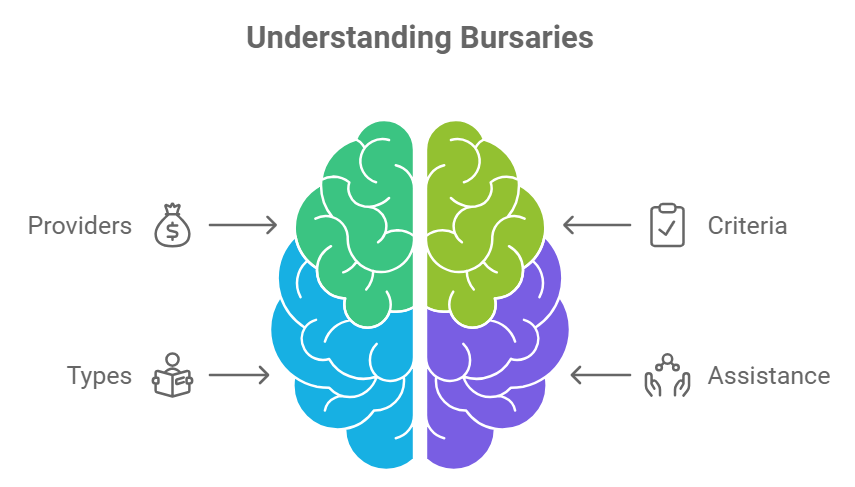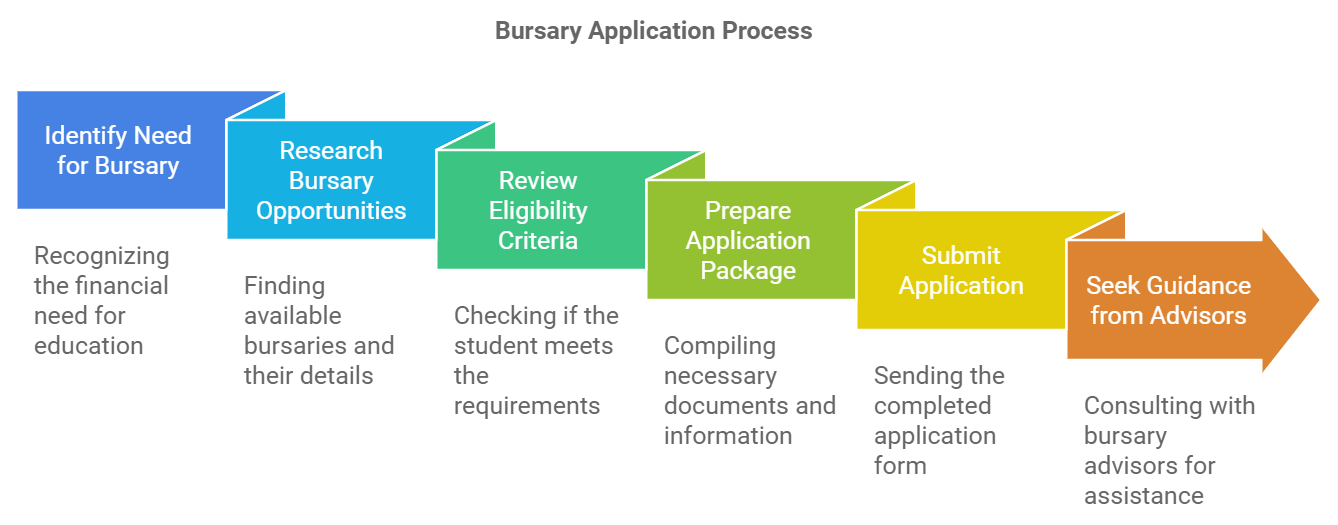Bursaries are essential in helping students gain access to higher education and skills development. Many students in the South African region come from disadvantaged backgrounds and cannot afford the cost of higher education, such as tuition fees, accommodation, and study materials. Facing the financial barriers will be tough for students. Bursaries can provide financial assistance to these students and help them reach their career goals. In this article, you can learn what a bursary is and understand the difference between a scholarship and a bursary.
Table of Contents
- What is a Bursary?
- How to Apply for a Bursary?
- What is the Eligibility Criteria for Funding Bursary?
- Bursary Application Forms Key Elements
- What is the Difference Between a Scholarship and a Bursary?
- Is the Bursary Amount Supposed to be Refunded?
- How can you Know If a Bursary is Legitimate or a Scam?
- List of Bursaries Available in South Africa
- Conclusion
- What is a Bursary? – FAQs
What is a Bursary?
A bursary is a type of financial aid provided to certain individuals based on different criteria to assist them in bearing the cost of their education. These financial aids are also available for working employees based on different criteria. Bursaries can be of various types which are further based on the bursary provider, candidates can explore the different programme bursary, fields and other types of bursaries.
To know more about the bursaries, you must also know that the bursaries are denoted generously by different companies, private donors, NGOs or any government funding. Different types of bursaries in South Africa have different criteria and processes that candidates need to follow to pursue their further education.
As you are aware, the goal of a bursary is to aid students and relieve any financial burden they face during their studies. Academic advisors in the financial aid department of universities or educational institutes can assist any potential candidate to get appropriate bursaries in South Africa.

How to Apply for a Bursary?
To apply for bursaries online or offline, you need to have proper information about the process, its application form and more. The Bursaries play a crucial role in promoting access to education and ensuring that financial constraints do not prevent deserving students from realising their academic potential.
The need for bursaries is quite high in South Africa. As socioeconomic disparities remain a significant challenge, bursaries work as lifelines for needy candidates, enabling them to pursue their dreams without the burden of crippling debt. These financial aid opportunities empower individuals and contribute to the development of a skilled workforce. Many organisations and institutions open their application windows as early as the preceding year. Prospective applicants can diligently research the available opportunities, carefully review the eligibility criteria, and prepare comprehensive application packages based on the education programme.
Additionally, educational institutions often maintain dedicated bursary offices or advisors to guide students through the application process specific to their field of study or institution. Furthermore, you also need to review the criteria for funding eligibility.

What is the Eligibility Criteria for Funding Bursary?
It’s important for individuals to learn how to apply for bursaries. You must also know that each bursary has different criteria depending on the organisation or company. Some of the common eligibility requirements are as follows:
- Candidate must be a South African Citizen (or South African permanent resident)
- Candidate must have a strong academic history
- Candidates must have currently studied in a specific field which can be suitable for bursary.
- Candidates must have applied or have been studying in a recognised university based in South Africa.
- Candidate must have Proof of financial need( income proof)
- They must go through the organisation’s checklist to ensure they are eligible for a bursary.
If you are successful, you will receive a bursary offer letter outlining the terms and conditions. Read the terms carefully and either accept or decline the offer by the specified deadline. Lastly, always check the specific requirements and deadlines for each bursary you are applying for. Additionally, apply for multiple bursaries to increase your chances of securing funding.
Bursary Application Forms Key Elements
Application forms can be different based on the organisation, NGO or financial institution. Some of the elements in the application form are as follows:
- Personal Details: Provide accurate personal information, including your full name, date of birth, contact details, and residential address.
- Academic Records: Submit official transcripts or academic records from your previous and current educational institutions, showcasing your academic performance and achievements.
- Financial Information: Disclose detailed information about your financial situation, including your family’s income, assets, and any existing debts or loans. Supporting documents, such as payslips or bank statements, may be required.
- Motivation Letter/Essay: Many bursary applications require a well-written motivation letter or essay, allowing you to articulate your ambitions, career goals, and reasons for seeking financial assistance.
- Extracurricular Activities: Highlight any extracurricular activities, community involvement, leadership roles, or volunteer work you have participated in, as these can demonstrate your well-rounded character and commitment.
- References: Provide contact information for references, such as teachers, employers, or community leaders, who can attest to your academic ability, character, and potential.
- Proofread and Review: Carefully review your application for completeness, accuracy, and any grammatical or typographical errors before submitting.
- Submission Instructions: Follow the specific submission instructions provided by the bursary provider. These instructions may include online or hard-copy submissions, deadlines, and any additional requirements.
Remember, a well-prepared and organised application package can significantly increase your chances of being considered for a bursary. You can browse online bursary applications for 2024 from different credible websites.
What is the Difference Between a Scholarship and a Bursary?
The major difference is that the scholarship is a financial award typically based on academic merit or exceptional talent in a specific area, such as sports, music, or art. Scholarships are awarded to students who demonstrate outstanding academic performance, achievements, or potential. They are often highly competitive, and the selection process may involve rigorous criteria, such as maintaining a minimum grade point average, submitting essays or portfolios, and participating in interviews.
Bursaries are financial aid awards primarily based on demonstrated financial need or socio-economic circumstances. They are designed to provide financial assistance to students who may not have the means to pursue higher education due to their family’s financial situation. Unlike scholarships, bursaries do not typically have stringent academic requirements, although some may require a minimum grade point average. Bursaries can be awarded by educational institutions, government agencies, private companies, or non-profit organisations, and they are generally non-repayable.
Is the Bursary Amount Supposed to be Refunded?
A bursary is designed to provide financial assistance to candidates, covering a range of expenses associated with their education, such as tuition fees, transportation, living expenses, and special equipment or software for studies. Tuition fees are often the primary expenses covered, as they constitute a significant portion of the overall cost of attending college or university. Some bursaries may also cover off-campus housing, textbooks, program materials, and other necessities.
Candidates are not required to pay back their bursary, as it aims to provide educational opportunities without the burden of heavy fees. Unlike loans, bursaries do not require repayment, allowing candidates to focus on their studies without financial stress. It is advisable to read about specific bursaries before applying to understand the expenses they cover.
How can you Know If a Bursary is Legitimate or a Scam?
As the cost of education rises, so does the number of scams exploiting bursary seekers. Fraudulent schemes prey on those desperate for financial assistance, often promising large sums of money in exchange for upfront fees. To avoid falling victim to these scams, candidates must approach bursary opportunities with caution and diligence.
To determine the legitimacy of a bursary, thoroughly research the organisation or institution offering the award. Reputable bursaries are typically sponsored by well-established educational institutions. Check the credentials, track record, and online presence of the organisation, institute, or NGO offering the bursary.
Additionally, be aware that legitimate bursaries rarely require application fees, and any request for sensitive information can be a red flag. By conducting proper research and exploring reviews from past recipients, you can reduce the risk of fraud and choose a genuine organisation for your bursary application in 2024 and beyond.
List of Bursaries Available in South Africa
There are different Bursaries available in South Africa. You can browse the latest list of bursaries open for application in the region or look for bursaries based on region. Basic details on the organisations can be available online. You can look for general, agriculture, accounting, laws, science, engineering, and other fields bursaries. Some of the Bursaries available in South Africa are as follows:
- Fasset Bursary
- FEMEF Mike Ilsley Memorial Scholarship
- Institute of Management Accounting and Strategy (IMAS) Bursary
- KPMG Bursary
- SAICA Thuthuka Bursary
- John Davidson Educational Trust Bursary
- Sanzaf bursary
- ARM bursary
- Cipla bursary
- Toyota bursary
Bursaries can be available for candidates based on different conditions. Before applying for any bursaries, you need to do your own research and choose the bursaries that suit your programme.
Conclusion
Bursaries are an invaluable form of financial assistance that helps make higher education more accessible to students in South Africa. Students can focus on their education and brighter future by lifting their financial burden. Bursaries in South Africa are available from different organisations, NGOs, educational institutions.
With the different processes of getting bursaries, you need to check the eligibility criteria and chances of getting the bursaries. You can research before applying for any bursaries available in South Africa.
About to take your first step towards bursary application? Regenesys is here to provide you with the course quotation to assist you in beginning your journey for the bursary. Besides, our career counsellor will offer you guidance to help you navigate the bursary application process. Connect With Us Now!
What is a Bursary? – FAQs
How do I apply for a bursary?
To apply for a bursary, you’ll need to complete the application form provided by the organisation or institution offering the bursary. This usually involves providing personal, academic, and financial information and writing an essay or statement explaining your need for the bursary.
What are the common eligibility criteria for bursaries in South Africa?
Some of the common eligibility criteria for bursaries include being a South African citizen or permanent resident, having a strong academic record, studying in a specific field, and already enrolled in or about to enrol in a recognised university in South Africa.
What are some tips for a successful bursary application?
Some tips for successfully applying for a bursary is that you need to follow all instructions carefully, provide complete and accurate information, highlight your financial need clearly, proofread for errors, get transcripts/documents in order ahead of time, ask for reference letters well in advance, and submit your application before the deadline.
How do bursaries differ from student loans?
Unlike student loans, which must be repaid, bursaries are financial aid awards that do not require repayment. They are essentially non-repayable grants provided to support student’s education based on criteria like financial need or academic performance.
What documents are typically required when applying for a bursary?
Common documents required include a completed application form, academic transcripts, a copy of your ID or birth certificate, proof of household income, and sometimes a motivation letter or essay.
If I accept a bursary, do I need to fulfil any obligations?
Some bursaries may have conditions attached, such as maintaining a certain academic performance level, agreeing to work for the sponsoring organisation for a set period after completing your studies or providing regular progress reports. It’s essential to carefully review and understand the terms and conditions before accepting a bursary offer.
What programmes are not funded by Bursaries?
Whether it’s a 2024 bursary application or a future bursary application, programmes that are not recognised or offered by unregistered education institutes are often not funded by bursaries.
Is it possible to apply for 2 bursaries?
Yes, candidates can apply for more than one bursary. But you need to check the bursaries that are still open for application, and accordingly, you can follow the process to get the bursary.
Can international/out-of-state students apply for bursaries?
Depending upon the bursaries, international candidates can also get the bursaries, following the eligibility criteria of the bursaries. Most bursaries are restricted to domestic students, while others are also open to international students. Be sure to check the specific requirements for any bursary you’re applying for. International students may need to show additional financial documentation.







1 Comment
Hello.This post was extremely fascinating, especially because I was browsing for thoughts on this topic last Thursday.